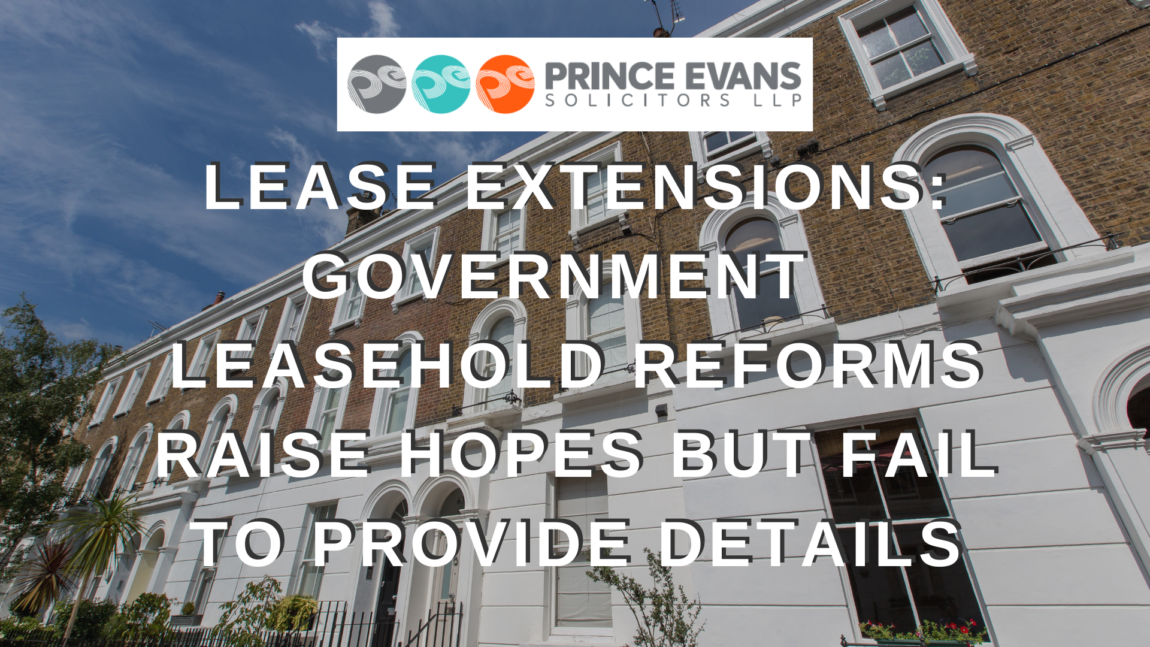
LEASE EXTENSIONS: GOVERNMENT LEASEHOLD REFORMS RAISE HOPES BUT FAIL TO PROVIDE DETAILS
- On 17 January 2021 the Government released a Press Release advising that they would be introducing reforms to make it easier and cheaper for Leaseholders to buy their own home which includes leaseholders extending their lease and acting collectively with other leaseholders to purchase the freehold of the property their flats were situated in .
- On the face of it, the Government Press Release gave the impression of impending legislation to reduce premiums payable and to simplify the legal process. Amongst the highlighted proposals were:
- A peppercorn (or nil) ground rent on all new leases;
- Extended Leases will be for 990 years, not 90 years added to the remaining term of the current lease;
- The setting up of an online premium calculator;
- The formula for calculating the premium for lease extensions and collective enfranchisements to be revised including capped ground rents in the calculation and the abolition of “marriage value” for lease extension premium calculations for leases with 80 years or less remaining of their fixed term;
- On collective enfranchisements, leaseholders to be able to agree to forego any development potential, so that any potential development value can be removed from the premium calculation; and
- Resurrection of commonhold tenure with a commonhold council set up.
- Many have commented however that the Press Release created more questions than it answered, as it does not contain details of the actual provisions or when they may be implemented, rather it refers to the 1200 page reports issued by the Law Commission in July 2020;these recommend a substantial overhaul of the whole leasehold enfranchisement procedure. However, the Law Commission does not state how premiums should be reformed but rather presents a number of options for the Government to consider. It also notes (with Counsel’s advice) the application of the European Conventions of Human Rights to the landlord’s property rights to ensure landlords are suitably compensated for the statutory interference with their property.
- Whilst the Government did indicate the abolition of ground rent on new leases and that this will be examined by Parliament during the current session (by 2024) the wholesale reform of the leasehold enfranchisement procedure will require substantial legislation. No doubt the various interested parties will make robust representations during the passage of any Bill through Parliament and there have already been soundings of potential Court proceedings regarding landlord’s human rights, if landlords are not satisfied with the legislation.
- The Government’s announcement has created uncertainty, by an expression of a bold intention to introduce very substantial change but without any detail as to the actual changes to be made or the timing of those changes. This has meant that it has been difficult for professional advisers to indicate what will happen in the future indeed the Association of Leasehold Enfranchisement Practitioners and others have called for the Government to issue further information on timescales, technical legal details and how the changes will work in practice.
- For many leaseholders there is still a need to extend leases without waiting for any reforms to become law , either because they have reaching a date whereby the “marriage value” will be incorporated within the formula for calculating the premium, (80 years or less) or because of other circumstances, such as wishing to re-mortgage or sell their property . Both lawyers and specialist surveyors advise that lease extensions, collective enfranchisement and other claims, (such as Right to Manage) remain very active; not least because the leaseholders remain acutely aware that the shorter the remaining term of alease, the higher the premium payable and the desire to have certainty in the event of any sale or re-mortgage.
If you which to discuss this please contact Jeremy Teall Partner on 0208 567 3477 or e-mail jeremy.teall@prince–evans.co.uk.
